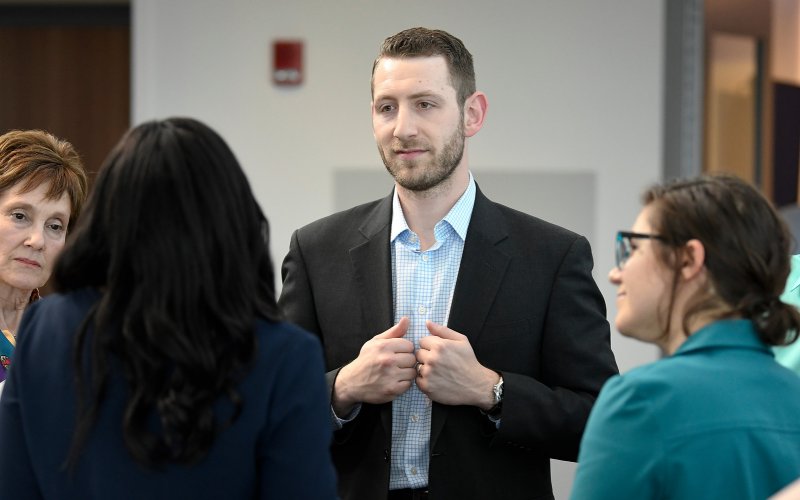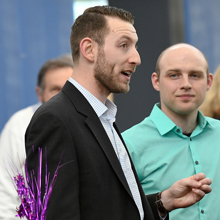Making Sense of Crisis: World Leader Response to the Pandemic

How Leaders Think
Assistant Professor of Management Matt Crayne wants to change the way we evaluate leaders. Instead of focusing on leadership traits and behaviors, we should examine how individual leaders think. He suggests that the way leaders make sense of the world, a concept called “sensemaking,” directly predicts how they will respond to problems.
The Pandemic “Opportunity”
As the pandemic started, Crayne and his co-researcher, Kelsey Medeiros at the University of Nebraska Omaha, were discussing a new project on digital leadership and social media, which they put aside as they realized it was the perfect time to explore the CIP (Charismatic, Ideological and Pragmatic) leadership model that each of them had previously researched.
COVID-19 provided an opportunity to study world leaders’ responses to the pandemic. The entire world was experiencing the same problem at the same time. The drastic variability of world leader reactions combined with public health and economic outcomes provided the perfect opportunity. Failures and successes were clearly evident and could be measured. The pandemic was the perfect environment to compare leadership styles.
“All world leaders, all across the globe, were facing this universal problem. What happens when their sensemaking is essential for success?” said Crayne, “It was a unique opportunity and a natural extension of our work.”
Crayne and Medeiros started work in mid-April, successfully submitting to American Psychologist in May.
Categorizing Leadership: Charismatic, Ideological and Pragmatic
The paper, “Making Sense of Crisis: Charismatic, Ideological, and Pragmatic Leadership in Response to COVID-19,” compares the leadership of three world leaders during the current pandemic: German Chancellor Angela Merkel, Canadian Prime Minister Justin Trudeau and Brazilian President Jair Bolsonaro. Each head of state exemplifies a different viewpoint and result.
Charismatic Trudeau: We Will Get Through This
In the CIP model, charismatic leaders are characterized as forward thinking and hopeful, with a strong vision of the future. Their optimistic approach may lead to trying to accomplish too many things at once, though the crucial attribute is their positive outlook. Examples of charismatic leaders include Martin Luther King, Jr. and Adolph Hitler.
Trudeau campaigned for prime minister on a platform of hope and approached his two terms as with confidence for the future. He responded to the pandemic the same way, maintaining “On the other side of this, when the economy comes roaring back, you will define our path forward, a path towards a better, more equal society. That’s what we’re doing together.”
Ideological Bolsonaro: Our Lives Have to Go On
Ideological leaders look to the past, composing a vision of previously established values, working to regain the glory that was. They tend to appeal to values, have a negative viewpoint and pursue few goals, possibly only one. This approach builds a core of a tightly knit followers who are more likely to deny evidence. Ronald Reagan and Margaret Thatcher are good examples of leaders who fall into the ideological framework.
Throughout his presidency, Bolsonaro has talked about the returning to the past greatness of Brazil and getting back to normal. That too, was the focus of his COVID response, dismissing the seriousness of the pandemic and wanting to get back to business. He said, “Our lives have to go on. Jobs must be kept. We must, yes, get back to normal.”
Pragmatic Merkel: We Can Manage This
Pragmatic leaders are problem-focused, rely on rational arguments and, in contrast to the other two styles, do not rely on emotional appeals. They focus on the present, not the past or future. Those who fit the pragmatist model are Benjamin Franklin and Dwight D. Eisenhower.
Merkel, with a Ph.D. in chemistry and a background in research, is a textbook pragmatist. She has been referred to as the “scientist-in-chief.” Merkel has taken a cautious approach, small sure steps to problem solving and supports evidence-based policy.
Even as the COVID cases decreased in Germany, Merkel stuck to her guns. She said, “The more we endure at the beginning of the pandemic and thus push the infection down, the more we serve not only human health but economic and social life.” Remaining focused on the problem at hand, she noted that things could get worse. “Precisely because the numbers give rise to hopes, I see myself obliged to say that this intermediate result is fragile, we are walking on thin ice.”
Pragmatism Wins, This Time
In late spring, as Crayne and Medeiros completed their study, COVID-19 cases in Brazil were climbing, Canada managed to keep their cases low, though Trudeau was criticized for not acting soon enough, and Germany had a mortality rate lower than its neighbors and other highly developed economies. Another pragmatist, New Zealand Prime Minister Jacinda Ardern took steps that resulted in her country becoming COVID- free for three months. New Zealand currently has only a handful of cases.
It seems that rationality won out. Though Crayne’s research found that the pragmatic approach has been more fruitful during the current pandemic, he is quick to point out that success within the CIP model is dependent on whether the approach matches the needs of a situation: The right leader for the right time.
“The ideological approach is useful when the world is chaotic to the point of distraction.” It is helpful when an old established company is challenged by an upstart. Ideological leaders frame the problem around corporate values, and appeal to these values to motivate action” explained Crayne, “Charismatic leaders frame the world around pushing forward. They are essential when you need dramatic shifts, as when a new CEO takes over and establishes a new vision. They bring people together and bring a sense of hope.”
Could Trudeau and Bolsonaro have transitioned to a more pragmatic viewpoint, resulting in a more successful COVID outcome? Crayne suggests that though the CIP leadership model considers the three approaches as stable and trait-like, emerging research considers whether leaders can identify and shift to non-dominant sensemaking approaches as situations warrant.
It’s All About the Followers
Crayne’s research focus is leadership, but followers are his prime interest. There are no leaders without followers, or as he puts it, “No leadership without followership.”
According to Crayne, leadership is a reciprocal process with followers granting the authority to lead. “Followers are generally more important than leaders,” he said, “We have implicit ideas of what leaders should be and are likely to dismiss others.”
Followers are drawn to one of the three leadership sensemaking approaches. Crayne notes that personal introspection is helpful. “When we decide who should lead, we should do an assessment. How leaders communicate ideas will provide an idea of the types of strategies they will use. We need to change the conversation from ‘What is a leader and what does a leader look like?’ to ‘How to do leaders think?’ and focus on the ‘why’ of leadership. Why are leaders the way that they are and why do they frame problems the way that they do?”
Matt Crayne

Matt Crayne entered the doctoral program at Penn State with the goal of consulting for a Big Four firm. In the second year of his Ph.D. he was offered an internship at PricewaterhouseCoopers which led to a job. He finished his Ph.D. a year into his tenure at PwC, just as he was hitting his stride as a researcher. Three years in, he realized that, though he enjoyed his work and loved working for PwC, he missed deep research work and teaching. Crayne left his position as PwC senior consultant of human capital and organization design, and landed at UAlbany, where he teaches undergraduate and graduate classes in leadership and organizational behavior. He serves as the faculty mentor for the World of Business Living Learning Community.
Want more?
Read “Making Sense of Crisis: Charismatic, Ideological, and Pragmatic Leadership in Response to COVID-19”
The Indigo Podcast: Matt Crayne and Kelsey Medeiros on Pandemic Leadership


